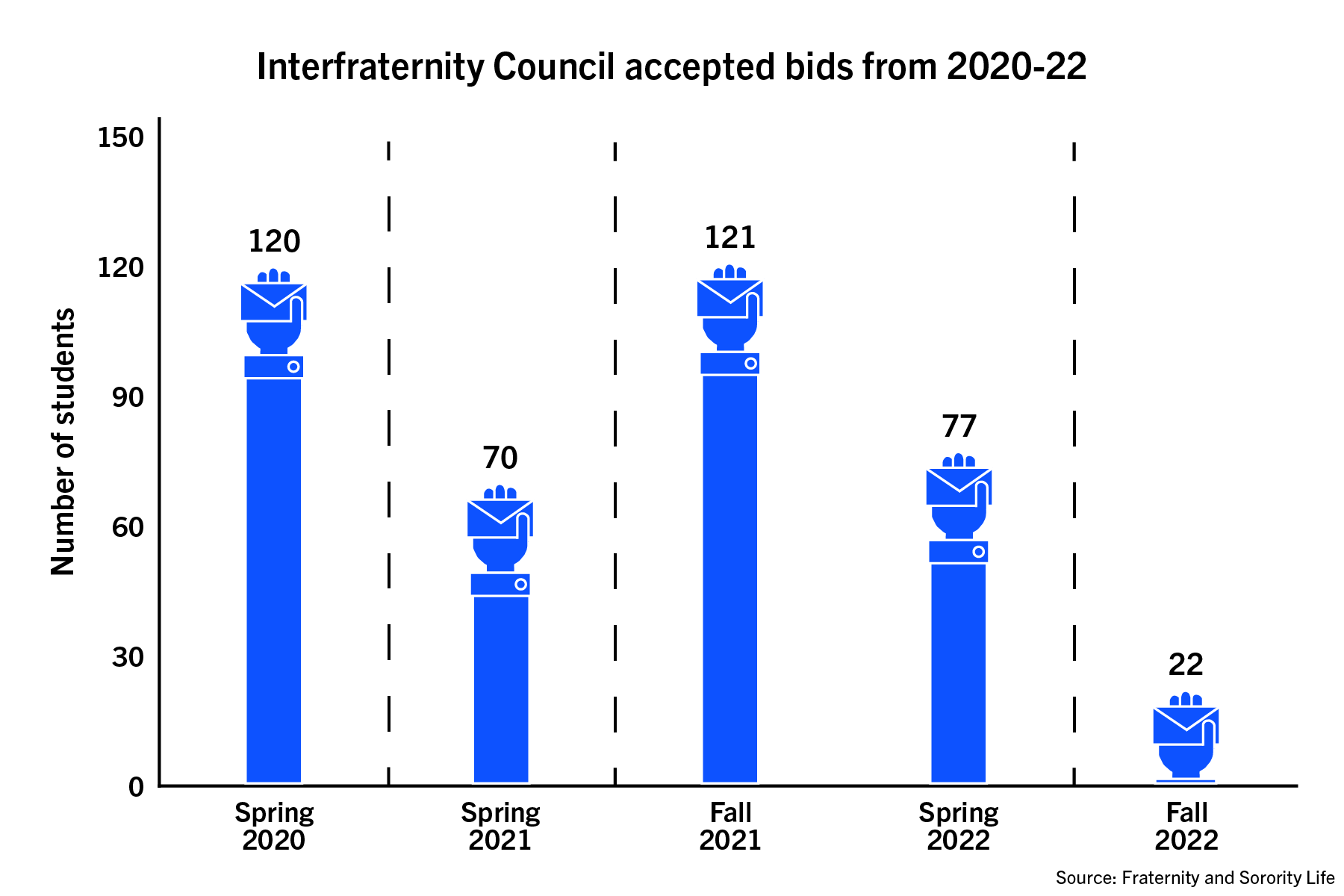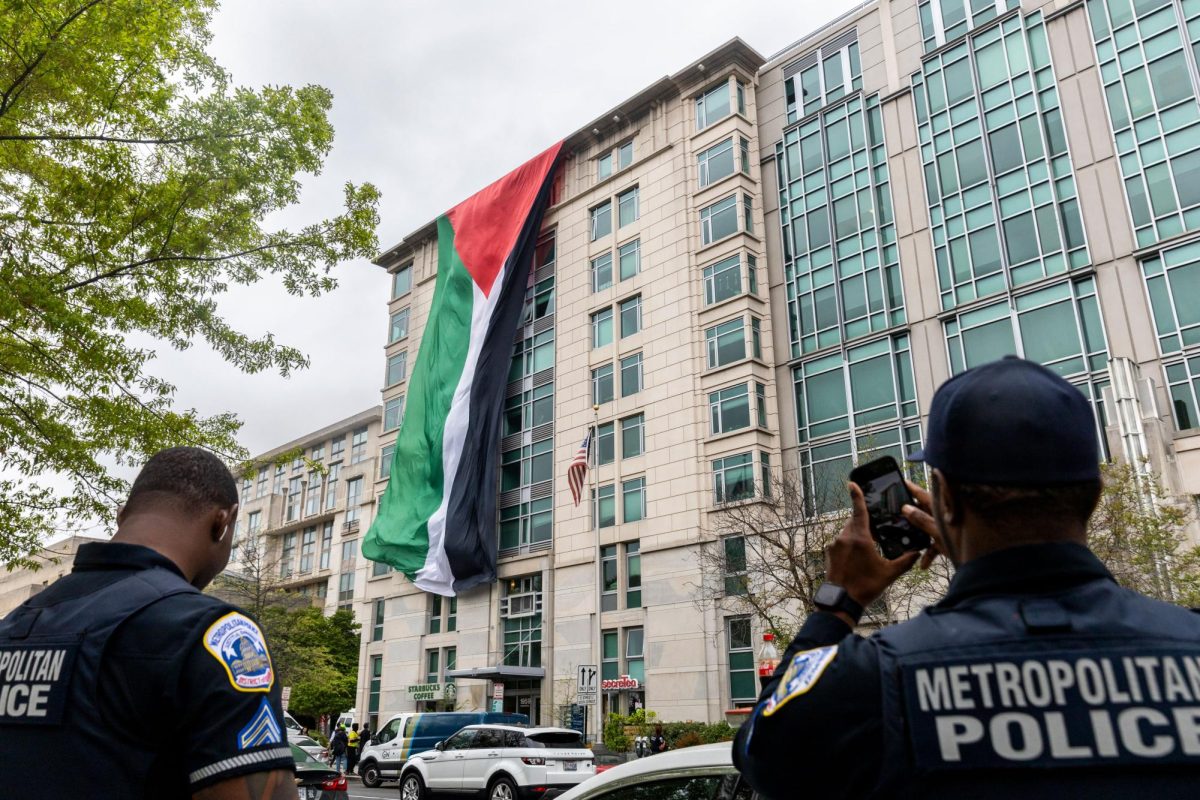Fraternity recruitment numbers took a nosedive this semester after officials reinstated a pre-pandemic policy requiring freshmen to complete 12 University credit hours before rushing.
Twenty-two students accepted bids from an Interfraternity Council chapter this semester, marking a steep drop from the 121 students who accepted bids last fall semester. Fraternity leaders said the University’s decision to restore the freshman credit requirement was likely responsible for the drop in fall recruitment numbers and may lead to financial struggles in the next semester as chapters grapple with less revenue from new members.
The University dropped its credit requirement for IFC rush last year to encourage freshmen to find community on campus following the pandemic, and recruitment figures spiked to match pre-pandemic totals with more than 50 more participants than spring rush months earlier.
Brian Joyce, the director of Fraternity and Sorority Life, said officials reestablished the 12-credit-minimum policy so prospective new members and fraternity chapters could become familiar with each other before offering and accepting bids so campus newcomers could have time to acclimate to Foggy Bottom academically and socially before committing to a chapter.
“Prospective new members can make more informed decisions about the fraternities and sororities that they are interested in joining by taking a semester to learn the culture and perhaps correct stereotypes about fraternities and sororities that they may carry with them from high school or popular media,” Joyce said in an email.

Nicholas Anastacio | Graphics Editor
He said Delta Tau Delta and Zeta Beta Tau added four new members, Kappa Sigma and Phi Gamma Delta added one new member, Sigma Alpha Epsilon added three new members and Sigma Chi added five new members during the fall recruitment period. Alpha Sigma Phi, Beta Theta Pi and Tau Kappa Epsilon recruited no new members during that period, Joyce said.
Officials censured Delta Tau Delta in May 2021 for alcohol violations and community disturbance, a sanction that expires after spring 2023, according to the Office of Student Affairs. Officials also placed Sigma Chi on disciplinary and social probation through May 2023, a sanction that will expire in spring 2024, after officials found the fraternity responsible for hazing and hosting an unregistered event with alcohol.
Joyce said social probation means a student organization is not allowed to host any event with alcohol present.
IFC President Patrick Tajanlangit said the IFC will establish an “open bidding” period for the first time this semester, allowing fraternities to continue to recruit upperclassmen past the fall informal recruitment period in an attempt to combat the low bid rates. He said recruiting new members brings in higher amounts of revenue from membership dues that fraternity chapters can allocate to pay costs to their national chapters.
“Chapters live off of numbers,” Tajanlangit said. “You need to pay a certain amount to national [chapters], and there are also a lot smaller chapters that do need the funds.”
Tajanlangit said he initially pushed officials to allow all freshmen to rush following last year’s surge in participation and positive feedback they shared in a post-recruitment survey. He said most IFC board members involved in the decision last spring on whether to drop or reinstate the freshmen credit policy were supportive of offering bids to freshmen in the fall regardless of credit count.
But he said he understands the University’s decision to restore the credit requirement to allow freshmen to find community outside of their fraternity and become familiar with the varying values and personalities of different chapters on campus before accepting a bid. Tajanlangit said AP credits acquired before freshman year do not count toward the 12 credits required to participate in recruitment.
“I think it’d be better for them,” Tajanlangit said. “Back when I was a freshman, I was only allowed to rush in the spring, and I think that helped me.”
He said the IFC will create a “lookbook” catalogue before spring recruitment, featuring each of the nine IFC chapters and listing information about their philanthropic profiles and required dues to help freshmen find a fraternity that’s right for them.
Jack Palaian, the president of Delta Tau Delta, said while allowing freshmen to rush last year helped increase recruitment numbers during the pandemic, the reinstatement of the 12-credit policy this year was expected and welcomed by fraternities, and IFC fraternities typically adhere to a spring rush format.
He said the IFC will promote community events for the duration of the semester in an effort to shift away from fall recruitment for freshmen, like co-hosting a basketball tailgate with George’s Army to mark the start of the basketball season.
“I’m actually a fan of spring rush, and I think it’s important to get acclimated to your new lifestyle and then decide what you do and don’t want to do,” he said. “That’s why we don’t actively recruit in the fall and the IFC is trying to move towards more community events.”
Christopher Haworth, the president of Kappa Sigma, said even though freshmen are prohibited from rushing this semester, many expressed interest at events like Meet the Greeks in early September, where Greek life organizations promoted their chapters in the University Student Center.
Haworth said he understands the reestablished credit requirement can allow freshmen to discover their own personal interests, but many chapters are now in a “very difficult situation” with low recruitment totals and small pledge classes going into the next semester.
“When we had Meet the Greeks, there were tons of freshmen coming through who were really excited and wanted to learn more,” Haworth said. “We were happy to talk to them, but we had to say, unfortunately, you’re not able to participate this semester.”
Haworth said in addition to University policy, low recruitment rates this semester are likely because all upperclassmen have already had several opportunities to go through the recruitment process.
“I will say, I think one of the reasons why the rush numbers were so low this year is because all of the sophomores or juniors who are wanting to come out to rush this semester had already had multiple opportunities to rush in the past,” Haworth said. “They could have rushed the semester before or even the one before that.”
Moss Gillespie, the president of Zeta Beta Tau, said the IFC decided to cut the usual week of fraternity recruitment events in late September down to one open night recruitment event due to low turnout and to respect Jewish holidays like Rosh Hashanah, which coincided with the rush schedule. He said he wished fraternity chapters were included more in the discussions among IFC leaders regarding the credit policy before officials finalized their decision about the credit requirement.
“I’m sure we’d all understand, but it just seems like there are these somewhat behind-the-scenes reasons,” Gillespie said.








